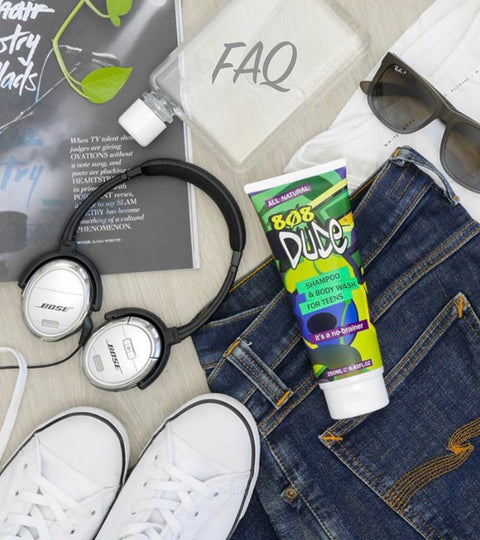Most commonly asked questions re: teenage skincare.
Being a skincare company, specialising in products for teenagers, we get quite a lot of emails from concerned parents asking how they can help their boys with acne breakouts, body odour, et cetera. This month, we have compiled our most frequently asked questions and, of course, our replies.
What exactly are pimples and why is my teenager getting them?
Without going into too much of a biology lesson, basically the skin contains sebaceous glands that naturally release sebum, an oily substance that helps protect skin. During puberty, changes in levels of the hormone testosterone can cause changes in the sebum produced which can then block hair follicles.
When dead skin cells and bacteria mix with the blockage, it can lead to the formation of spots. Bacteria in the skin multiply, which can cause pain and inflammation beneath the blockages. The types of spots include blackheads (small, blocked pores), whiteheads (small, hard bumps with a white centre), Pustules (spots with a lot of pus sitting just under the skin) and nodules (hard, painful lumps under the skin).
What are some foods that can help with preventing breakouts? Which foods should we avoid?
There are many foods that are thought to be beneficial for the skin because they reduce inflammation. These food are rich in zinc, vitamins A and E and antioxidants. Foods such as carrots, apricots, sweet potatoes, spinach and other dark green and leafy vegetables, blueberries, brown rice, quinoa, beans, peas, and lentils as well as oily fish like salmon and mackerel are great for helping to keep not only the inside of your body healthy but give your skin a helping hand in avoiding breakouts.
Foods to avoid include sugar, sugary drinks and all processed foods. Whole natural foods are the best for your skin and your health in general.
What age should I start my son on a skin care routine?
It’s never too young to start caring for your son's skin, however, around 10 years of age is probably a good time to introduce a routine. An easy to use face wash applied with the fingers and rinsed off with warm water is a good start. Add to this a head to toe body and hair product which has been formulated specifically for adolescents and you have started a great routine that will set them up for their entire teenage years.
My son hasn’t had any breakouts yet, but his friends have. Have we avoided it or will he get them soon?
He may be lucky, but most teenagers get some form of acne, at some point. Some only get a few pimples now and then, and others unfortunately may be covered in them. Even after decades of research, scientists still don’t have a definite answer to what really causes acne. It is most probably a combination of various factors although it is most likely genes that determine whether someone gets acne or not. This could be due to the way skin reacts to hormonal changes which affect us all during puberty.
All of a sudden my son has really started to sweat and smell. Is this normal?
It sure is! Adolescents sweat more because the new hormones released at the onset of puberty cause an increase in the amount of moisture sweat glands produce. Additionally, teens sweat in more places. There are two types of sweat glands in the human body- eccrine glands and apocrine glands- and they function quite differently.
Eccrine glands are spread all over our body and they produce sweat that is mainly salt and water. Eccrine glands open directly onto the surface of the skin. This sweat helps regulate body temperature and is usually odourless.
Apocrine glands are located mainly in the armpits and around the groin. They start working to make oils as well as sweat at the onset of puberty. Activation of the apocrine glands only happens at the onset of puberty. Apocrine glands are much less numerous than eccrine glands. They are found in places which normally have hair or, in the case of adolescents or pre-teens will have hair, like the armpit and genital region.
These apocrine sweat glands continuously secrete a concentrated fatty sweat into the gland tube. Emotional stress stimulates contraction of the gland, expelling its contents. Skin bacteria break down the fats into unsaturated fatty acids that possess a powerful odor. The apocrine glands make sweat at the same time as the eccrine glands, and they make even more sweat when you are stressed!
My son has started getting body odor, but he seems oblivious to it. How can I get him to improve his own hygiene routine?
Some teens struggle with the concepts of their changing needs and refuse to shower or apply deodorant as often as they should. As a parent you need to first make the decision whether it is a problem for you or is it a problem for them. If your son looks dirty, smells bad or is not getting on at school this could be a signal that it is a problem. Talk to them about your own experiences. It can be uncomfortable to start a conversation about body odor and hygiene, especially with an over sensitive teenager. However, having a direct and respectful talk now can also help with other issues they will face during puberty. Picking the right time and place for this delicate conversation is paramount!
We suggest purchasing some personal care items geared for teens. Body wash, soaps and deodorant that are specifically formulated for teens that are left in the bathroom might just disappear quickly. Don't buy what you would buy for yourself or better still, get your son involved with the purchase.
If the problem is impacting on how your son is interacting with others and they just will not listen to you, it’s time to enlist the help of another discreet family member like an older sibling or a professional. Kids will often listen to another trusted adult.
My son is 14. The hormones have kicked in, the pimples have appeared, despite a pretty healthy diet. I limit his sugar etc. What do you recommend?
Most teenagers get some form of acne and there are many myths about what causes it. Although having a healthy diet rich in anti-inflammatory foods is a great way to help care for skin, most teenagers will develop acne or at least have breakouts.
In addition to a good diet, a good skin care routine will help reduce breakouts and control acne. We recommend a two step routine:
Step 1
808 Dude Zit Free Face Wash for Teens is an easy face wash applied with the fingers and rinsed off with warm water. Applied preferably twice a day, but at least once a day, this face wash uses Aloe Vera to nourish and soothe the skin. It also contains Witch Hazel for its astringent and antibacterial capabilities and Chamomile for its powerful anti-inflammatory properties. Lavender and Tea Tree oil are carefully combined with a range of other natural ingredients to create a face wash which meets the needs of a teenage boy’s skin.
Step 2
808 Dude Clear Skin Spot Free Gel is specifically formulated for persistent acne and those nasty red spots. This gel works quickly to dry up pimples and reduce inflammation. The secret to its healing powers lies in the combination of Manuka Honey and Sweet Almond Oil along with Argan oil, Tamanu oil, Tea Tree oil and other essential oils. Manuka honey decreases inflammation of the skin and has anti-bacterial properties which helps reduce infection. Sweet Almond Oil is packed with Vitamin A and E. Vitamin E helps to keep skin cells healthy while Vitamin A actively fights against acne by cleaning out pores. The effects of this gel can be seen quickly- just what teenagers want!
My son has lost his confidence. He doesn’t want to go out and be seen. What can I do?
Puberty can be a difficult time for a boy. For them there isn’t just one event or sign that they are growing up. There are lots of them, including growth spurts, their voice changing, facial and body hair and an awakening sexuality. They are coping with changes in their body, acne and body odor as well, at a time when they already feel awkward and self-conscious. Unexplained mood swings, aggression, depression and low self-esteem are all difficult to handle in themselves but add them to the physical changes they are experiencing and puberty can be a really tough time.
As a mum you want to make this difficult time as easy as possible. Being there for them and giving them emotional support is of course essential during this challenging time. You can help ease some of the symptoms, especially the physical ones of acne, body odor and oily hair by introducing them to a skin care and hygiene routine but if your son is losing his confidence and becoming withdrawn it may be appropriate to seek some professional help. Your GP should be a good starting point. Your son’s school may also have a guidance officer or pastoral worker that may also be able to assist you.
Will natural products work as well as the products I can buy at the supermarket?
Contrary to what many leading cosmetic companies would like you to believe, organic and natural products have been used with great success in the past and present. Most of the ingredients that are included in modern organic and natural skincare products have been used for centuries.
These products have been developed using natural ingredients that have been known for their extraordinary benefits for the skin. These ingredients have proven their worth and have been shown not to have any adverse side effects (individual allergies excluded), encouraging healthy and beautiful looking skin.


0 Comments
There are no comments yet. Be the first one to post one!